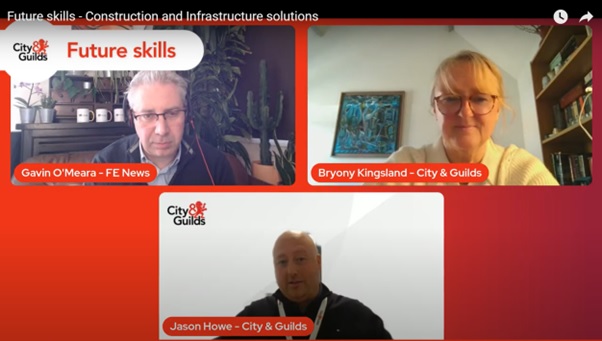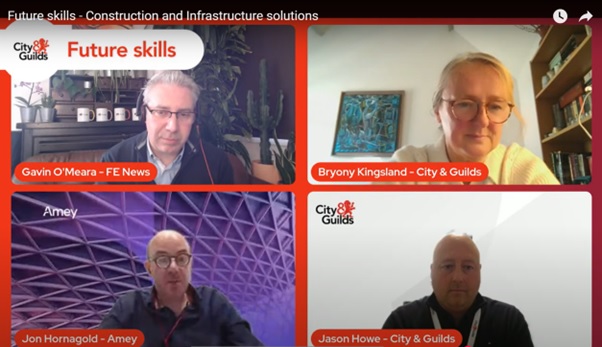Future Skills: Construction & Infrastructure – Building a Stronger Construction Workforce
Tackling the skills gap from the ground up
09 May 2025
In this week’s episode of Future Skills, we spotlighted one of the UK’s most essential and rapidly evolving sectors: construction and infrastructure. Hosted by Bryony Kingsland (City & Guilds) and Gavin O'Meara (FE News), the session offered grounded, timely insights on how the industry can address urgent skill shortages and prepare for the future.
From the outset, it was clear: this isn’t just about bricks and mortar. The conversation explored key findings from City & Guilds’ Making Skills Work – The Path to Solving the Productivity Crisis report, revealing that fewer than half of working-age adults felt prepared for their careers when they left education, a warning sign for any economy to grow sustainably.
Jason Howe (City & Guilds) and Jon Hornagold (Amey) joined the discussion to take a deep dive into the sector’s pressing challenges and opportunities.
What’s trending in construction careers?
Jason pointed to a positive trend: more learners are enrolling in full-time courses. But the sector still faces a shortfall in apprenticeship uptake and direct-to-employment routes. Colleges are stepping up, but stronger links between education and industry are urgently needed.
 “We need to attract more learners into apprenticeships and keep them there,” Jason explained. That requires not just investment in learners but also in the infrastructure that supports them.
“We need to attract more learners into apprenticeships and keep them there,” Jason explained. That requires not just investment in learners but also in the infrastructure that supports them.
A familiar issue resurfaced: the tug-of-war between industry and teaching. Skilled tradespeople are in high demand, and FE providers struggle to match industry salaries when recruiting tutors. “Many in construction only consider teaching once they physically can’t stay on site,” Jason noted.
To shift that narrative, Jason and Bryony discussed the benefits of teaching, like family-friendly hours, reduced physical strain, and the deep personal satisfaction of helping learners succeed. “There’s no better feeling than seeing someone pass their end-point assessment,” Jason added.
Can shorter apprenticeships fill the gap?
The group discussed the government’s proposed foundation apprenticeships, shorter, fast-tracked programmes designed to fill skills gaps quickly. While well-intentioned, Jason cautioned: “You can’t shortcut experience. Skilled trades are built over time, with practice and mentorship.”
Bryony raised concerns around clarity and employer perception. Will these shorter routes translate to meaningful employment or leave learners underprepared for site work? The risk is that traditional apprenticeships could be undermined in the process.
Digital skills meet traditional trades
Jon highlighted a major shift: the digitalisation of buildings and infrastructure. Data is now central to construction, driving efficiencies and supporting the transition to net-zero.
“We need to grow the talent we have,” Jon said. “Construction now demands both traditional and digital skills, they’re no longer separate, they’re intertwined.”
Unlocking growth through SME support
 The government’s recent £600 million investment is a welcome step to address critical skills shortages. But Jon stressed that this funding must be more accessible to SMEs - vital cogs in the supply chains of projects large and small.
The government’s recent £600 million investment is a welcome step to address critical skills shortages. But Jon stressed that this funding must be more accessible to SMEs - vital cogs in the supply chains of projects large and small.
“SMEs struggle with bureaucracy when trying to upskill staff,” he said. “We need to cut red tape and ensure these businesses can access the support they need to drive the sector forward.”
Final thoughts: building the base
One thing is clear: the opportunities to improve are there. What’s needed now are better pathways from education into employment, stronger engagement with employers, and better storytelling around the value of teaching in FE.
As Jason summed up, “We can’t just flood colleges with learners. We need clear, supported routes to real jobs, and we must value the people guiding learners along the way.”
Stay tuned for more Future Skills sessions as we continue building a skilled, resilient workforce for the UK’s future.
Future skills - Construction and Infrastructure solutions
Visit the construction sector page to learn more about our offer.